
落叶归根

Artist: Molly
Ancestry
落叶归根 (Luo Ye Gui Gen) — "The leaves must return to their roots" is a Chinese idiom that expresses the innate human desire to return to one’s origins. It is no surprise that many migrants yearn to return to their homeland. Their descendants often feel a need -- or at least a curiosity -- to learn where they came from and who their ancestors were. Even a fifth-generation Chinese family in Venezuela suddenly felt the urge to trace their lineage. The movement of 落叶归根 is gaining momentum, with Chinese communities around the world setting out to rediscover their roots.
In China, and across social media, a rising movement celebrates ancestral homelands. Giant drums in ancestral temples make sure the world knows where these roots lie.
In China’s traditional village system, it was not uncommon for each village to be associated with a single surname. This was because, upon marriage, the groom would remain in his village while the bride, arriving in a sedan chair, would adopt her husband's surname and bear children to carry on his family name. This custom helped preserve ancestral names and lands. It’s often said in villages, “We know everyone here, even the names of their pets.” That’s why, if you know your ancestor’s name and a bit of background, even a taxi driver can help you find their village. I experienced this firsthand when visiting my uncle in Putian. All I had to do was give the driver his name and village, and before long, I was standing at the doorstep of my ancestral home.
Historically, Putian had only a handful of surnames before the region merged with migrants from the North, which introduced many more villages and surnames with their own unique identities.
Prof. Chen C.Y. notes: “Prior to the merging with the Han people from the North, the only surnames recorded were Lan, Lei, Che, and Yi (蓝, 雷, 车, 蚁).” Zhou (2008f) further explains: “Thirty surnames moved to Putian during the Tang Dynasty, including about nine well-known ones such as Zhang (张), Fang (方), Mi (米), Chen (陈), Ye (叶), Qiu (邱), Zhan (詹), Xie (谢), and Fu (傅), who settled in Xianyou.”
More surnames were added because according to the Putian Chronicles (2016b), migration from Putian to the Nanyang began as early as 1368. Genealogical records show that families bearing surnames such as Chen (陈), Huang (黄), Ke (柯), Cai (蔡), Xu (许), Li (李), and Wang (王) were among those who migrated to the Nanyang.
The ancestor of the Wang group from Jiangdou was Yan Qing aka Zicheng. He was originally from Shibiwei, Nan'an, Fujian Province. (王氏始祖严清,字子诚。原籍福建省南安石鼻尾). A more detailed history of this group is located at: Jiangdou Wang Family.
As migration continued, more surnames were added over time. Some notable arrivals from the North were generals from the era of Emperor Qin Shi Huang (秦始皇), such as General Wang Jian (王翦将军), General Wang Mang (王莽将军), and General Zhao Tuo (赵佗将军). Other renowned figures, like General Guan Yu (关羽将军) from the Romance of the Three Kingdoms, were also associated with these migratory movements.
Among Putian’s prominent figures was Huang An (黄岸), who became a prefecture governor (刺史) and is believed to have migrated from Henan. He, along with Huang Tao (黄滔; 840 AD – 911 AD) and Huang Gongdu (黄公度; 1109 AD – 1156 AD), is revered as an ancestor of the Huang clan in Putian. These examples illustrate how the variety of surnames in Putian expanded over time.
Some of these surnames are listed in the following section for your interest. Those highlighted in light-blue colour come with additional literature in their respective sections. Those that are underlined are linked to a third-party documentary video. Please watch at your own discretion.

A sedan chair could be carried by either two or four bearers. The two-person version functioned much like public transport, commonly used to ferry passengers from one place to another or up and down mountain slopes. In contrast, the four-person sedan chair was typically reserved for special occasions, such as weddings. These grander processions were often accompanied by musicians playing gongs and cymbals to announce their arrival. In many parts of China, especially in rural areas, the entire village would come together to celebrate such joyous events.
Sedan chairs have faded from the city landscape, and in its place are high-end BYD cars.
A sedan chair with 4 bearers.
Source: Jason Ong
A Putian Patriot

General Zhang Yunyi
(1892–1974)
(张云逸,原名张运镒)
A True Son of Putian
General Zhang Yunyi never forgot his ancestral roots in Putian, though he was born in Wenchang County on Hainan Island. In a moment of quiet sincerity during the war, he revealed to his comrade-in-arms, General Chen Guozhu (Liao Hua), that his ancestors came from Putian and asked that this truth be made public. This act of remembrance and pride in his lineage stands as a powerful testament to his loyalty, not just to his country, but to his heritage as well.
Zhang Yunyi came from humble beginnings, born into a peasant family. Despite early hardship and the need to abandon formal schooling, he rose through the ranks after joining revolutionary movements, first as a member of the Tongmenghui in 1909, and later as a key leader in the Communist Party of China. He fought in the Revolution of 1911, resisted warlordism, and eventually took up arms against both Japanese invaders and internal threats to China’s stability.
Throughout decades of struggle, whether in resisting foreign invasion or enduring internal political upheaval like the Cultural Revolution, Zhang remained steadfast in his service to the Communist Party and the people of China. In recognition of his immense contributions, he was awarded the rank of General in the Chinese People’s Liberation Army in 1955 and held multiple senior positions in the party and government.
Yet, amid all these honors and titles, it was his quiet declaration of his Putian origin that reflected a deeper identity, an identity rooted in family, culture, and a homeland he never saw but never forgot. His heartfelt wish to affirm his Putian ancestry makes him not only a national hero but also a proud son of Putian, whose memory lives on in the hearts of his people.
When he passed away in 1974 at the age of 82, China mourned a loyal soldier and leader. But for Putian, he will always be remembered as one of their own, a man who never let greatness erase his roots. This is the mark of a true son.
Excerpts from: Party History Research Office of Hainan Provincial Committee of the Communist Party of China. Editor: Yun Mengyi.
Source: http://m.hkwb.net/content/2021-06/03/content_3972605.htm
---
A Tribute to General Zhang Yunyi: A Beacon for the Lost
The story of General Zhang Yunyi stands in stark contrast to a conversation I once had with a young man who claimed to be Hinghwa. Despite identifying with the name, he confessed that he knew nothing about the Hinghwa people, our language, our culture, or our heritage. He said, with disheartening honesty, that he had lost his identity. He no longer saw himself as Chinese and, more tragically, had grown to resent his own people. His bitterness had even turned violent at times. Before I could respond with hope or understanding, the chat was abruptly cut off. I never heard from him again.
This encounter proved that I was wrong when I told a Vietnamese friend that he would forever be an Asian regardless of how many hamburgers he eats or whether he speaks or dresses like Americans.
Nevertheless, that brief encounter with the Hinghua had left a mark on me. It reminded me how fragile identity can be, and how easily our cultural roots can be lost in the noise of modern life. It also reinforced the urgency of the work I’m doing to preserve and share our Hinghwa and Putian heritage. At times, it feels like a lonely effort, too big for one person. But in moments of doubt, I think of General Zhang Yunyi.
Though born far from the mainland on Hainan Island, General Zhang never forgot his roots. In the midst of war, he found time to tell his comrade that his ancestors hailed from Putian, and made a heartfelt request to have that fact known. It wasn’t a political move or a strategic confession, it was an expression of deep, personal pride in his heritage. Despite the chaos of revolution, war, and national rebuilding, he carried his identity with honour.
His story ignites hope in me. It assures me that all is not lost. For every person who forgets, there may be another who remembers, and one remembrance can reignite many others. General Zhang Yunyi, a battle-hardened hero of modern China, was also a true son of Putian. He had certainly made his ancestors very proud. And his legacy reminds us that our heritage is not just history, it is a fire waiting to be kept alive.
May we carry that flame forward.
Tracing Your Ancestry Through Surnames
(This list is not exhaustive and will be updated as new information becomes available.)
蔡 (Cai); 曹 (Cao); 陈 (Chen, Tan); 楚 (Chu);
邓 (Deng); 董 (Dong);
方 (Fāng, Hong); 冯 (Feng); 傅 (Fu);
黄 (Huang, Hwang, Ng);
姬 (Ji); 贾 (Jia);
柯 (Ke);
蓝 (Lan); 雷 (Lei);
李 (Li); 廉 (Lian); 梁 (Liang); 林 (Lin);
马 (Ma); 米 (Mi);
潘 (Pān); 彭 (Péng); 丘 & 邱 (Qiu);
王 (Wang, Ong); 翁 (Weng, Ong); 吴 (Wu);
杨 (Yang); 叶 (Ye); 蚁 (Yi); 于(Yu);
姚 (Yeow, Yeoh, Yeo, Yau, Jauw);
詹 (Zhan); 张 (Zhang); 郑 (Zheng); 周 (Zhou);
朱 (Zhu).
Eighteen 'Prime Ministers' (宰辅) of Putian
莆田十八宰辅蔡京
Cai Jing; (蔡京; ca. 1047-1127)
Cai Bian; (蔡卞; 1049 AD – 1117 AD)
Cai You; (蔡攸; 1077 AD - 1126 AD)
Chen Hongjin; (陈洪进; 914 AD – 985 AD)
Chen Jing Monument; (陈靖; 948 AD-1025 AD)
Chen Junqing (Merit); (张翔陈 俊卿 (赠) (1112 AD – 1186 AD)
Chen zhuo; (张翔陈卓 (张翔陈卓; 1167 AD - 1252 AD)
Chen Wen Long; (陈文龙; 1232 AD – 1278 AD)
Gong Maoliang; (张翔龚茂良; 1121 AD – 1179 AD)
Huang mingjun; 黄鸣俊; 1580 AD – 1645 AD)
Huang yong; 黄镛; 1230 AD - 1300 AD)
Zeng; Liu judao) (Merit); (留居道, 赠); (Era Unknown)
Pan chengyou; (潘承佑; 968 AD - ?)
Weng Chengzan; (翁承赞; 859 AD - 932 AD)
Ye yong; (叶颙) (1400 AD - ?)
Zheng Qiao; (郑樵; 1104 AD – 1162 AD)
Zhou Rupan; (张翔周如磐; 1567 AD -1626 AD)
Zhujizuò; (朱继祚; 1593 AD - 1649 AD)
[NOTE: SOME IMAGES OF THE ABOVE CAN BE VIEWED FROM THE FOLLOWING LINK.]
https://www.toutiao.com/article/7171425565395485187/
蔡
(Cai)
Please click on the surname for the video link.
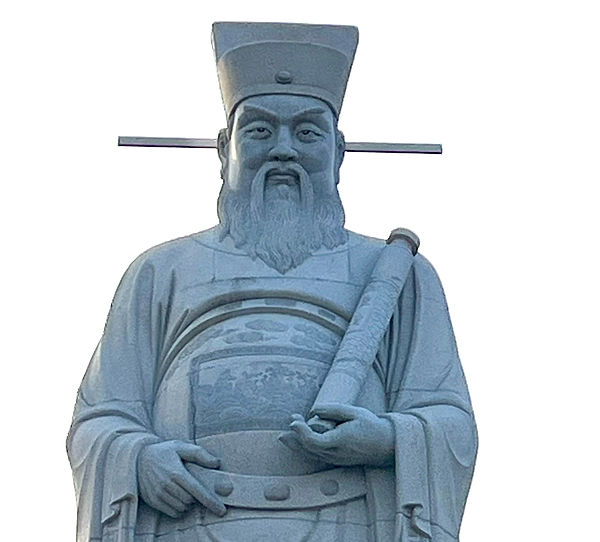
Source: 王顺龙 & 林洲
Source: 王顺龙 & 林洲
Cai Xiang (蔡襄; 1012 AD – 1067 AD)
Cai Xiang was a native of Fengting Town, located in Xianyou County, Fujian Province. A Jinshi of the Song Dynasty, he was widely celebrated for his mastery in calligraphy, literature, and tea culture. His contributions to these fields were so profound that he authored numerous influential works still appreciated today.
But Cai Xiang’s brilliance extended well beyond the written word. He was an early advocate for environmental stewardship, initiating large-scale tree planting campaigns that lined roads for hundreds of miles. His vision helped green the landscape, improve public welfare, and beautify the empire.
As an imperial official, Cai Xiang was known for his unwavering integrity. He ruled with impartiality and had zero tolerance for corruption or misconduct among his peers. His reputation for honesty and upright governance earned him great respect at court.
In recognition of his service and moral stature, the emperor awarded him one of the highest positions within the palace. After his passing, he was posthumously honored with the title of "Loyalty and Benevolence" (忠惠), a testament to a life devoted to justice, culture, and the common good.
Gong Mao Liang
(龚茂良)
(1121AD – 1179AD)

Gong Mao Liang was a renowned imperial scholar who rose to prominence as a premier during the Southern Song Dynasty. His reputation was built upon his integrity, diligence, and unwavering dedication to public service.
Gong was entrusted with some of the most crucial responsibilities in the empire, including the appointment, removal, and promotion of officials. He was known for his sharp political acumen, able to see through the hypocrisy and dishonesty of wayward imperial officials. His ability to discern genuine talent from corruption made him a key figure in the imperial administration.
As a high-ranking law enforcement officer, Gong Mao Liang did not hesitate to take decisive action against those who abused their power. When court officials improperly bestowed titles, he was swift to withdraw them, ensuring that only the most deserving received honor. His efforts to curb corruption, nepotism, and cronyism were instrumental in maintaining the integrity of the imperial bureaucracy.
The emperor acknowledged and praised Gong for his no-nonsense approach to governance, which had a profound impact on the imperial court. His contributions were not only in his administrative prowess but also in the moral clarity with which he approached his duties.
Gong Mao Liang, like many other great figures of his time, was deeply influenced by the teachings of Lao Tzu and Confucius. These two pillars of Chinese philosophy shaped his approach to governance, ethics, and personal conduct, guiding China during one of its Golden Ages.
Li, Lee
Please click on the surname for the video link.
The surname 李 (Li or Lee) traces its ancestry back to Emperor Li Shimin of the Tang Dynasty.
Li Fu (李富; 1085AD – 1162AD)
(An Extraordinary Hero)
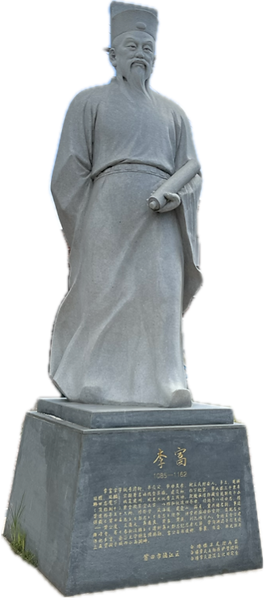
Source: Jason Ong, 林洲 & 张元昌
“The highest virtue is not virtuous, and that is why it is virtuous.” – Lao Zi
Li Fu was an extraordinary individual who donated his family's wealth to mobilize 3,000 soldiers in defense against the Jin army during the early Song Dynasty (Li & Li, 2016).
He demonstrated a profound sense of social responsibility and patriotism, leading efforts in building bridges, undertaking water conservation projects, and supporting defense-related initiatives.
Li Fu is fondly remembered for his kindness and generosity. According to Chen (2019e), following his death, the Prime Minister of Hinghua Fu during the Ming Dynasty ordered a temple to be built in his honor, alongside four other revered figures.
As a result, the temple was renamed the Temple of Five Sages (明成化年间,兴化府太守岳建五贤祠,将李富奉入祠内).
Documentary showing a three thousand year history leading to the descendants of the Tang Dynasty Emperor
Source: @铭铭之中 (洋尾村)
The documentary features the hometown of Li Fu.
Their ancestral hometown is Yangwei Village, located southeast of Baitang Town in the Hanjiang District of Putian. This village has been home to the Li Clan since the Tang and Song Dynasties, and has undergone several renovations during the Ming and Qing Dynasties.
The memorial hall in the village also showcases an impressive list of Li imperial scholars, better known as Jinshi (进士).
Note: The following images and Chinese text were used with permission from Putian Xiaoyuwan. The translation is courtesy of Google; please read with discretion. Thank you.
History of Yang Wei Village
(Hometown of the Li Clan)
洋尾村的历史
(李氏故里)
Source: 莆鱼网直播
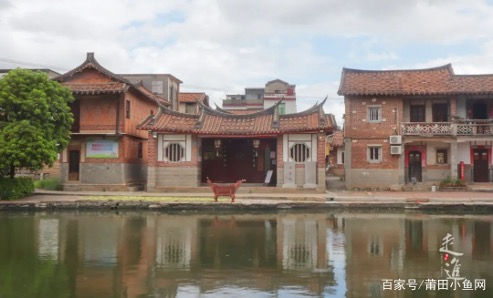
说起洋尾村,人们总是要把洋尾和李姓连在一起,因为此处是李氏聚居的一个古老村落,最早可追溯到唐宋时期。当时为躲避武则天迫害,唐高祖李渊第二十个儿子江王李元祥之子李皎逃到福建。到了宋咸平二年(999年),李元祥第十四世孙李伯玉迁入白塘洋尾村,安居于此。这里不仅是“抗金英雄”李富的故里,还是李嘉诚的祖籍地呢。
Google Translate:
History of Yang Wei Village (Hometown of the Li Clan) History of Yang Wei Village (Hometown of the Li Clan) When talking about Yang Wei Village, people always associate Yang Wei with the surname Li, because this is an ancient village where the Li family lived, which can be traced back to the Tang and Song dynasties. At that time, in order to avoid the persecution of Wu Zetian, Li Jiao, the son of Li Yuanxiang, the 20th son of Emperor Gaozu of Tang, fled to Fujian. In the second year of Xianping in the Song Dynasty (999), Li Boyu, the 14th grandson of Li Yuanxiang, moved to Baitang Yang Wei Village and settled here. This is not only the hometown of Li Fu, the "anti-Jin hero", but also the ancestral home of Li Ka-shing.

洋尾村人杰地灵,据典籍记载,从宋至清朝,历史上走出了98名进士,62名举人和216名职官。这里古韵悠长,留下许多宝贵的历史遗存,有两块牌匾、三块牌坊、四座祠堂,还有多处古民居。今天,小编就带大家走进洋尾村。
Google Translate:
Yangwei Village is a place of outstanding people and beautiful scenery. According to historical records, from the Song Dynasty to the Qing Dynasty, 98 Jinshi, 62 Juren and 216 officials came out of it. This place has a long history and many valuable historical relics, including two plaques, three archways, four ancestral halls, and many ancient houses. Today, the editor will take you to Yangwei Village.
柏府归荣坊
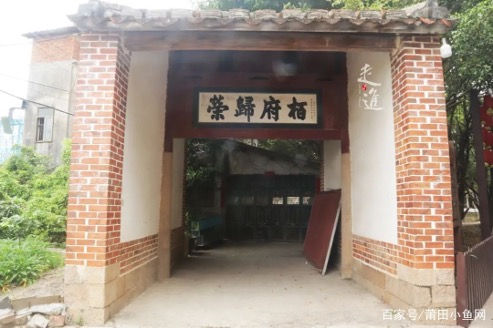
洋尾村历史上一共存有7座牌坊,但现在只剩下三座。这座柏府归荣坊位于村口党建公园附近。这座牌坊始建于明代,是洋尾李氏族人为纪念明代成化进士、广东按察使司佥事李元镇荣归故里所建。
Google Translate:
There were a total of 7 memorial archways in Yangwei Village in history, but only three remain now. The Baifu Return Archway is located near the Party Building Park at the entrance of the village. This memorial archway was first built in the Ming Dynasty by the Yangwei Li clan to commemorate the return of Li Yuanzhen, a Ming Dynasty Chenghua Jinshi and Guangdong Censor.
白塘科第坊

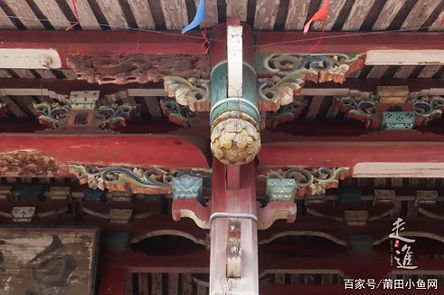
沿着村道往前走,便可看见一座牌坊临湖而立。这座白塘科第坊是由御史李廷梧之父李长源在明成化年间创建,清代有重修,近代皆有修缮。“白塘科第”木匾为明代书法家周瑛所写,在木匾下面的梁柱上还记载了自宋至清上科第者四百余人,旨在褒扬先贤,以激励后人,这是洋尾村李氏明清两代科第鼎盛的历史凭证。
Google Translate:
Walking along the village road, you can see a memorial archway facing the lake. This Baitang Kedi Archway was built by Li Changyuan, the father of the censor Li Tingwu, during the Chenghua period of the Ming Dynasty. It was rebuilt in the Qing Dynasty and repaired in modern times. The wooden plaque "Baitang Kedi" was written by Zhou Ying, a calligrapher in the Ming Dynasty. On the beams and pillars below the wooden plaque, there are records of more than 400 people who passed the imperial examinations from the Song Dynasty to the Qing Dynasty. The purpose is to praise the predecessors and inspire the future generations. This is the historical evidence of the prosperity of the Li family in Yangwei Village in the Ming and Qing Dynasties.
佥判第坊
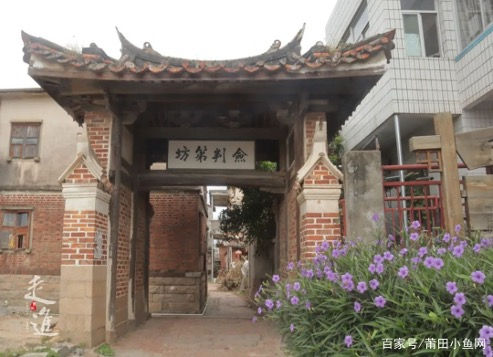
这座牌坊位于洋尾李角自然村,是为李富次子李延耀所立。他随父助国抗金有功,官授广东惠州佥判。他任职期间造福一方,深受百姓爱戴,所以子孙请文为他建坊。在上世纪六七十年代曾遭破坏,后被重新修缮。
Google Translate
This memorial archway is located in Yangwei Lijiao Village. It was built for Li Fu's second son, Li Yanyao. He helped his father fight against the Jin Dynasty and was appointed as the assistant judge of Huizhou, Guangdong. During his tenure, he benefited the people and was deeply loved by the people, so his descendants asked Wen to build a memorial archway for him. It was destroyed in the 1960s and 1970s and was later renovated.

祁阳祠
祁阳祠就在白塘科第坊旁,全称是祁阳邑侯李公祠,是为纪念明代湖广永州府祁阳县知县李龙而建。祁阳祠始建于始建于明代,因为祠堂久经年岁,早已坍塌多处,无法修缮,近年由李氏族人捐资重建,祠内的抱鼓石、石础、天井仍是原件。
Google Translate:
Qiyang Temple is located next to Baitang Kedifang. Its full name is Qiyang Yihou Ligong Temple. It was built to commemorate Li Long, the magistrate of Qiyang County, Yongzhou Prefecture, Huguang Province in the Ming Dynasty. Qiyang Temple was first built in the Ming Dynasty. Because the temple has collapsed over the years and cannot be repaired, it was rebuilt in recent years with donations from Li's clan. The drum stone, stone foundation and patio in the temple are still the original ones.
州牧祠
Zhou Mu Temple

州牧祠位于祁阳祠附近,这是清乾隆年间直隶州司马李光文的祠堂,现在也是莆阳姓氏源流馆。
Google Translate:
The Prefecture Governor's Temple is located near the Qiyang Temple. It was the temple of Li Guangwen, the Sima of Zhili Prefecture during the Qianlong period of the Qing Dynasty. It is now also the Putian Surname Origin Museum.

整座建筑坐北朝南、面阔三间,由砖埕、门厅、天井、主殿组成。因年久失修,又遭虫蛀,近年经过抢修,已焕然一新。
Google Translate:
The whole building faces south and is three rooms wide, consisting of a brick courtyard, a foyer, a patio, and a main hall. Due to years of disrepair and insect infestation, it has been repaired in recent years and looks brand new.

李氏大宗祠
Li's Ancestral Hall
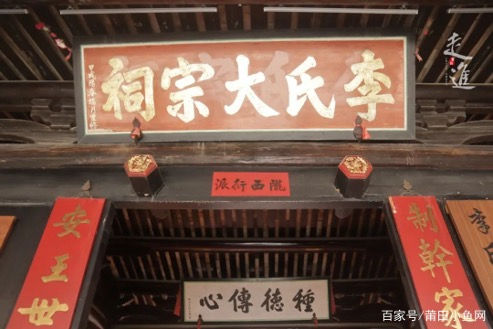
李氏大宗祠就在洋尾村李角自然村117号,它始建于明朝,在清乾隆二十八年(1763年)利用明原构件重建,为厅事故址构立祠堂。
Google Translate:
The Li Clan Ancestral Hall is located at No. 117, Lijiao Village, Yangwei Village. It was first built in the Ming Dynasty and rebuilt in the 28th year of Emperor Qianlong's reign in the Qing Dynasty (1763) using original Ming components to build an ancestral hall on the site of the hall.
NOTE: Ancient Chinese characters reads from right to left. So the words above should read as 李氏大宗桐.
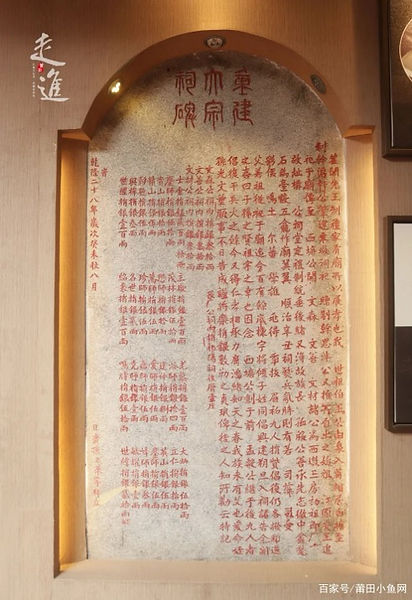
大宗祠坐北朝南,面阔三间,是由大埕、前殿和正殿组成。这里是李氏宗亲会的活动场所,挂满了海内外宗亲送的金匾、镜框、题词、楹联。大宗祠现也开辟为李氏家风家训馆。
Google Translate
The Grand Ancestral Hall faces south and is three rooms wide. It consists of the Grand Courtyard, the Front Hall and the Main Hall. It is the venue for the activities of the Li Clan Association and is hung with gold plaques, picture frames, inscriptions and couplets sent by clan members at home and abroad. The Grand Ancestral Hall is now also used as a museum to commemorate the family traditions and teachings of the Li Clan.
李富祠
Li Fu Temple
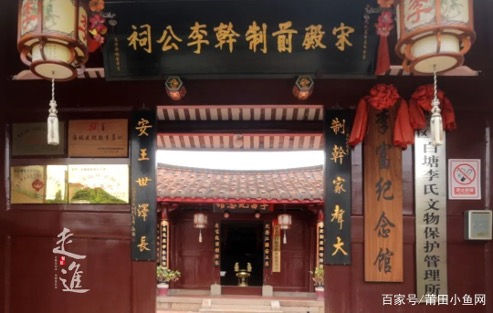
李富祠坐落在洋尾东墩自然村,临湖而建。大门悬挂一匾“宋殿前制干李公祠”,因;李富曾任殿前统制司干办公事官(简称制干),所以世称李富为"李制干"。大门左右悬挂“江王世泽长;制干家声大。”这是白塘李氏常用的门联。
Google Translate
Li Fu Temple is located in the natural village of Dongdun, Yangwei, and is built by the lake. A plaque "Song Dianqian Zhigan Li Gong Temple" is hung on the gate. Because Li Fu once served as an official in the Dianqian Tongzhisi (abbreviated as Zhigan), Li Fu is known as "Li Zhigan". On the left and right of the gate are hung "Jiang Wang's family lineage is long; Zhigan's family reputation is great." This is a common door couplet used by the Baitang Li family.

祠堂面阔三间,整体坐北朝南,是由门厅、砖埕、前厅、天井和正殿组成。从大门而入,可见前厅门额上挂着“宋制干李富纪念馆”牌匾,近年来政府将李富祠辟为李富纪念馆,馆内设有多幅介绍李富的生平事迹的画图,让参观者从多方位全面地了解李富,并学习他身上的可贵品质。
Google Translate:
The ancestral hall is three rooms wide and faces south. It consists of a foyer, a brick courtyard, a front hall, a patio and a main hall. Entering from the main door, you can see a plaque with the words "Song Zhigan Li Fu Memorial Hall" hanging on the lintel of the front hall. In recent years, the government has turned the Li Fu Temple into the Li Fu Memorial Hall. There are many paintings introducing Li Fu's life and deeds in the hall, allowing visitors to understand Li Fu from all aspects and learn from his valuable qualities.

祠堂上还挂着“种德传心”匾额,这是宋代进士王进所书写。这块牌匾与“白塘科第”木匾是洋尾村仅存的两块文物牌匾。
正殿中间有李富头戴官帽,身着朝服的座像。
Google Translate:
There is also a plaque with the words "Planting virtue and passing on the heart" hanging on the ancestral hall, which was written by Wang Jin, a Jinshi in the Song Dynasty. This plaque and the wooden plaque with the words "Baitang Kedi" are the only two cultural relics plaques left in Yangwei Village. In the middle of the main hall, there is a seated statue of Li Fu wearing an official hat and court robes.

李富以“家国天下”为己任,一生行善施仁,他在世时曾建桥34座,筑堤造田3800多亩,重修多座庙宇,还开办多所学堂,坊间至今还流传着许多李富的传奇故事,称其为“千载殊绝人物”也毫不夸张。
Google Translate:
Li Fu took "family, country and the world" as his responsibility and did good deeds throughout his life. When he was alive, he built 34 bridges, constructed embankments and reclaimed more than 3,800 acres of farmland, rebuilt many temples, and opened many schools. Many legendary stories about Li Fu are still circulating among the people. It is no exaggeration to call him "a rare figure in the ages."
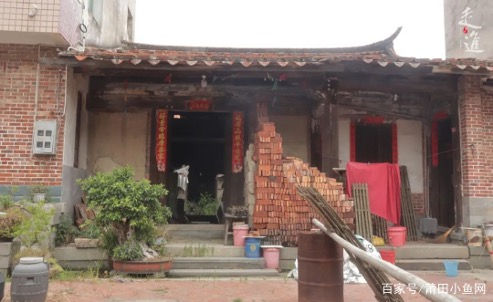
漫步在洋尾村,踏着村道四处闲逛,那些散落在村中各处的莆仙红砖厝,它们是洋尾村的历史记载者,收藏着旧日不可复制的珍贵时光。
Google Translate:
Strolling in Yangwei Village and wandering around the village roads, you will see the Putian red brick houses scattered throughout the village. They are the recorders of Yangwei Village’s history, collecting the precious and irreplaceable times of the past.

在洋尾东西还有一座对称的鸳鸯房,为清代时期所建的土木结构古厝。据还住在这里的老人说,这座古厝听说是一对兄弟所建,具体是谁建的,何时建的,他也不清楚。“我一个叔叔九十五岁,去年刚去世,他也说不上这个老房子的来历”老人说道。
Google Translate:
There is also a symmetrical mandarin duck house in the east and west of Yangwei, which is an old house of civil structure built in the Qing Dynasty. According to the old man who still lives here, this old house was said to be built by a pair of brothers, but he is not sure who built it and when it was built. "My uncle is 95 years old and just passed away last year. He can't tell the origin of this old house either," said the old man.

村里还有很多房子因常年无人居住和修缮,疏于管理,空置的更是早已断壁残垣,大多老房子最终的命运都是沦为了鸡鸭养殖场,实在有些可惜了。
Google Translate:
There are still many houses in the village that have been uninhabited and neglected for many years, and some of them have long been in ruins. Most of the old houses eventually became chicken and duck farms, which is really a pity.

芳草萋萋,流水淙淙。走在洋尾村里中,每一个角落无不充斥着古朴气息。“暧暧远人村,依依墟里烟”的田园风光叫人来了一眼就不想离开。如果你也喜欢这样的静谧古色,闲暇时刻不妨约上两三好友,一起去探访莆田历史文化古村洋尾村吧!
Google Translate:
The grass is lush and the water is gurgling. Walking in Yangwei Village, every corner is filled with a simple and ancient atmosphere. The pastoral scenery of "the distant village is warm and the smoke in the market is lingering" makes people not want to leave after one look. If you also like this kind of quiet and ancient scenery, you may want to invite two or three friends to visit Yangwei Village, an ancient historical and cultural village in Putian in your spare time!
Li Fu Ancient Hometown.
Additional videos
Source: 王顺龙, 林洲 & 张元昌
I sincerely thank 张元昌 and 林洲 for the unforgettable tour of the ancient hometown of Li Fu, tracing the Li Genealogy back to the Tang Dynasty emperors; and the hometown of Tan Xun Yi (father of Singapore's first Hin Ann President, Tan Yeow Joo).
Zhang Yuanchang
(张元昌)

莆田市莆仙旅游发展有限公司
总经理、
莆田市涵江区政协常委,
莆田文化推荐者.
Zhang Yuanchang (张元昌), General Manager of Putian Tourism Development Co., Ltd., Standing Member of the CPPCC Hanjiang District, Putian City, Putian Culture Promoter.
In spite of my last-minute notice and amidst his busy schedule, he still found time to help me in my study tour schedule, and took me and Lin Zhou on a tour to some of Putian's important historical sites featuring some of the most notable Hinghua in the region.
My deep gratitude for his dedication to promoting Hinghua Culture.
林
(Lin, Lim, Ling)
Please click on the surname for the video link.

Heading 6
Jiumulin; (九刺史)
Source: Xiao Yuwan
Lin Pi (林披) (Patriach of the nine Lin brothers). Lin Wei (林苇) 端州刺史. Lin Zao (林藻) 江陵刺史. Lin Zhe (林著) 横州刺史. Lin Jian (林荐) 韶州刺史. Lin Ye (林晔) 通州刺史. Lin Yun (林蕴) 邵州刺史. Lin Meng (林蒙) 循州刺史. Lin Mai (林迈) 雷州刺史. Lin Ji (林蔇) 福唐刺史.
The 林 (Lin, Lim, Ling) ancestry has an impressive list of very notable people. It is uncommon to have one provincial governor in a village, let alone 9 in one house.
Lin Guang Chao
(林光朝; 1114–1178 AD, known as 南夫子 or "Master of the South")
Lin Guang Chao was a native of Xiuyu District, Putian County, part of the Xinghua Army region during the Song Dynasty (modern-day Putian, Fujian Province).
He earned the prestigious Jinshi title during the Song Dynasty and went on to serve in several high-ranking government roles, including that of Minister. A prolific writer and respected lecturer, Lin's works were so influential that some were included in major Chinese encyclopedias. This literary contribution earned him the esteemed title "Master of the South" (南夫子).
Upon his passing, he was posthumously awarded the honorary title of "Wenjie" (文节), a designation reserved for distinguished scholars.
Lin Guang Chao is a shining example of perseverance. He did not pass the imperial examination on his first try -- but he persisted, eventually succeeding and rising to prominence. Over his lifetime, he authored approximately 30 volumes, securing his legacy as one of the great literati of his time.
Lin Run (林润; 1530–1569)

Lin Run was born in the Xiawu District of Xinghua Prefecture (兴化府内下务巷) during the Ming Dynasty -- an area known today as Zhenhai Street in Licheng District, Putian City (今莆田市荔城区镇海街道).
In 1556, Lin Run achieved the rank of Jinshi (进士), an imperial scholar, and later served as an imperial censor (御史) -- a position comparable to today’s Deputy Premier. He was celebrated for his upright character and fearless pursuit of justice. Known for speaking truth to power, Lin Run enforced the law with unwavering integrity.
When bandits threatened the safety of the region, he rallied local men to defend their city and successfully expelled the invaders. Even when faced with powerful figures -- including those connected to the imperial family -- he upheld justice with courage and impartiality. Recognizing the need for systemic change, he gained the emperor’s approval to reform royal policies, ensuring they better served the common people.
During the Wokou crisis—a period when Japanese pirates raided coastal towns—Lin Run urged the state to allocate relief funds and implement tax breaks to help citizens recover and rebuild their communities.
Despite holding high office, he lived modestly in a rundown home within a quiet neighborhood. His humility and dedication moved the emperor, who ordered the construction of a mansion for him in the thriving Xiawu District.
Lin Run’s final appointment was as Governor of Yingtian, where he served for three years before passing away from illness. His legacy, however, endured—not only as a paragon of virtue and reform but also through his lineage.
One of his descendants, Lin Lan Ying, would later become a pioneer of modern technology in China, influencing one of the most powerful nations in the modern world. The legacy of Lin Run lives on -- not just in history books, but in the progress and innovation of the generations that followed.
陈
(Chen, TAN)
Please click on the surname for the video link.
玉湖陳氏文化
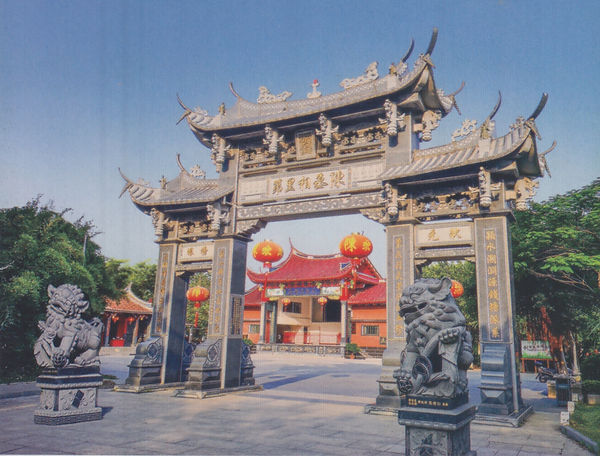
Sources:
玉湖陈氏理事会
玉湖祖祠董事会
莆田陈文龙纪念馆
玉湖陈仁文化教育基金会
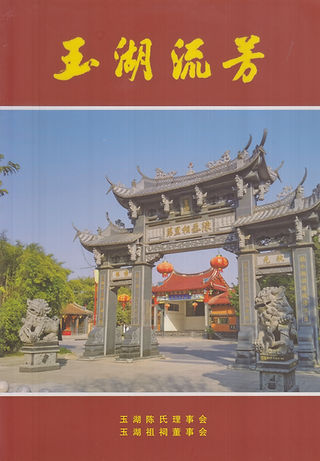
This book was a generous gift from 玉湖陈氏理事会.

Disclaimer
The translation is by Google. Please read with discretion.
Thank you.
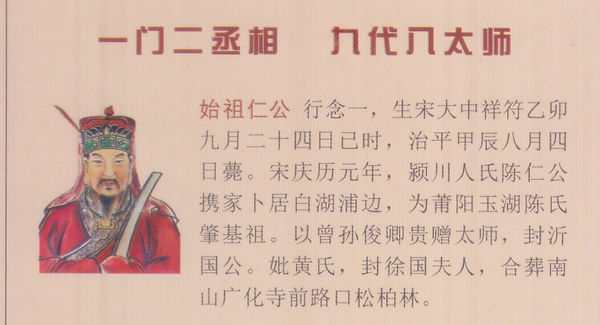
Google Translate:
The first ancestor, Ren Gong Xing Nian Yi, was born on September 24, Yimao, Dazhong Xiangfu, Song Dynasty, and died on August 4, Jiachen, Zhiping. In the first year of the Qingli period of the Song Dynasty, Chen Ren Gong, a native of Yingchuan, settled with his family near Baihu Lake, and became the founder of the Chen family of Yuhu, Putian. His great-grandson Junqing was given the title of Grand Tutor and was given the title of Duke of Yi. His wife, Huang, was given the title of Lady of Xu State, and they were buried together in the pine and cypress forest at the intersection in front of Guanghua Temple in Nanshan.

Google Translate:
The second ancestor, Guigong Xingniansan, was born at the hour of Chou on the 16th day of the fourth month of the Gengchen year of the Kangding reign. He ascended to heaven and was repeatedly recommended but could not get up. He died on the 20th day of the fourth month of the Yihai year of the Jingsheng reign. He was given the title of Grand Tutor by Sun Junqing and was given the title of Duke of Shu. His wife, Li, was given the title of Lady of Shu and was buried together with him in the north of Shiquan Temple in Nanlili.

Google Translate:
The third generation ancestor, Duke Shen, was born on the 3rd day of the 10th month of the Bingwu year of the Zhiping reign. He died on the 29th day of the 1st month of the Bingwu year of the Jingkang reign. His son Junqing was given the title of Grand Tutor and was given the title of Duke of Ji. His mother, Huang, was given the title of Lady of Yue, and Zhuo was given the title of Lady of Ji. They were buried together on the left side of the Shu State Cemetery.

Google Translate:
Chen Junqing
The fourth generation ancestor, Junqing Gong, was named Yingqiu and alias Liumei. He was born at 3:00 pm on the 7th day of the 10th month of the Guiyi year of the Zhenghe period. He ranked second in the imperial examination in the Wuwu year of the Shaoxing period. He was successively appointed as the left prime minister and concurrently the envoy of the Privy Council and the junior teacher. He was given the title of Duke of Wei and the posthumous title of Grand Tutor. He died on the 22nd day of the 11th month of the Bingwu year of the Chunxi period and was posthumously named Zhengxian. He married Nie, who was named Lady of Wei and buried together with him at Longji Mountain in Baofengli.

Google Translate:
The fifth generation ancestor, Duke Qin Shao, was eighteen years old. His great-grandson Wen Longgui was given the title of Grand Tutor and Duke Yongguo. He married Ouyang and was given the title of Lady Qiguo. They were buried together in the east of Guanghua Temple in the south wing.

Translate:
The sixth generation ancestor, Jing Gong, was named Bolu and was born on the second day of the eighth month of the Yichou year of Shaoxing. He was given the title of Grand Tutor and the title of Duke of Anguo because of his grandson Wenlong. He married Huang and was given the title of Lady of Yueguo. They were buried together in the north of Mulanbi.
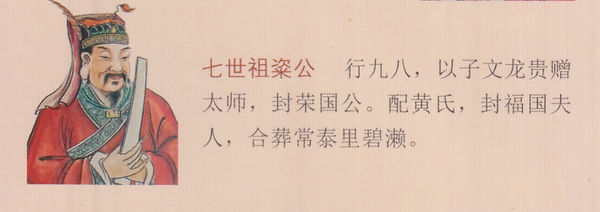
Google Translate:
The seventh generation ancestor, Gong Xi, was the 98th. He gave his son Wen Longgui the title of Grand Tutor and was given the title of Duke of Rong. He married Huang, who was given the title of Lady of Fuguo and was buried together in Bise, Changtai Village.
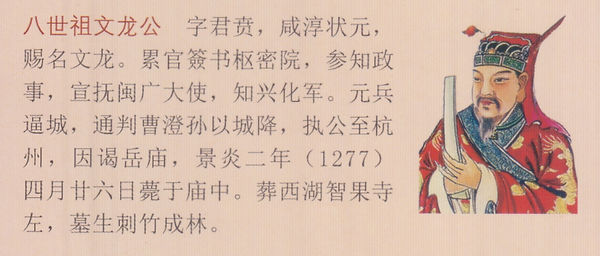
Google Translate:
Chen Wen Long
The eighth-generation ancestor, Wenlong Gong, was styled Junben, and was the top scholar in the imperial examination of Xianchun. He was given the name Wenlong. He served successively as the secretary of the Privy Council, the vice-chancellor, the envoy to Fujian and the governor of Xinghua Army. When the Yuan army besieged the city, the magistrate Cao Chengsun surrendered the city. They took the Gong to Hangzhou and visited the Yue Temple. He died in the temple on April 26, the second year of Jingyan (1277). He was buried on the left of Zhiguo Temple in West Lake. A forest of thorny bamboos grew on his tomb.
Chen Junqing (Merit)
(陈俊卿 (赠) 1112AD – 1186AD)
Source: Jason Ong & 林洲

Minister Chen Junqing (陈俊卿)
Minister Chen Junqing was renowned for his fearless dedication to duty, even when it meant impeaching powerful ministers. His boldness, tempered with compassion, earned the admiration of the emperor, who praised him as possessing the "bravery of a benevolent man" (仁者之勇).
One of Chen’s greatest strengths was his discerning eye for talent—he had an uncanny ability to identify the right general for the right task. As a statesman, he demonstrated exceptional skill in both governance and military affairs. Yet beyond the palace walls, he also had a gift for connecting with the common people. His popularity, along with the influence of his family's cultural values, helped foster education and civic virtue in his hometown of Yuhu (玉湖), or ‘Jade Lake’, in Putian.
The Chen family upheld a longstanding tradition of moral and scholarly cultivation. Their ancestral teachings emphasized the Four Pillars of Virtue: loyalty, righteousness, filial piety, and compassion (忠义孝慈), as well as classical studies and etiquette (诗礼经书), which served as the foundation for generations of upright officials (Chen, 2020a).
When Chen Junqing passed away in 1186 AD, the emperor personally ordered a grand state funeral in his honor. The Ministry of Transport was tasked with overseeing the arrangements—an extraordinary gesture reflecting Chen’s importance. At his tomb, the emperor had inscribed four virtues in his memory: "Honest, Loyal, Bright, and Sincere" (清忠亮直)—an eternal tribute to a man whose life embodied integrity and wisdom.
Please click on the surname for the video link.

This ancestral book was a generous gift from Mdm. Ng Suat Kheng
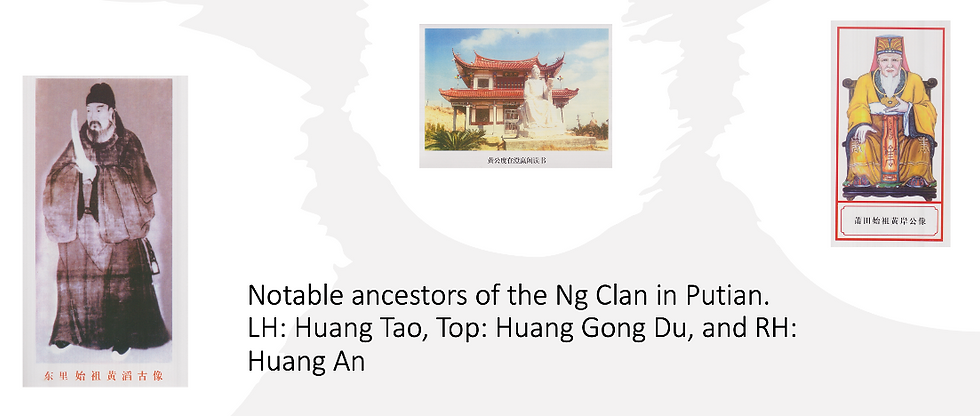
(黄) Ancestors .Source: Hwang Ancestors Publication
Apart from the family of nine prefecture governors known as Jiumulin, the Huang (黄) family stands out with an equally impressive record -- 11 imperial scholars.
According to the Huang clan genealogy, their ancestry can be traced back to three notable figures: Huang An, Huang Tao, and Huang Gongdu. The patriarch of the Huang clan, Huang An, originally hailed from Henan and migrated to Putian, exemplifying the integration of northern and southern
Chinese cultures.
Interestingly, it’s often noted that people from northern China tend to be genetically taller. This is reflected in the Huang clan as well, with many members known for their height.
Huang An (黄岸; 680–762 AD)
A native of Huang Xiang, Putian (莆田黄巷), Huang An is regarded as the founding ancestor (始祖) of the Huang clan in Fujian (Zhou, 2008, p. 16). He was the 12th grandson of Huang Yanfeng (黄彦丰), the first Huang known to migrate from Henan (河南固始) to Fujian with his father, Huang Zhiyuan (黄知远). During the Tang Dynasty, they traveled from Fujian to Hanjiang via Fuzhou (Huang Z.X., 2012).
Huang An was also the grandfather of Huang Pu, who later earned the prestigious Jinshi title. Huang An himself served as Prefecture Governor (刺史) of Guizhou, and also held the role of County Magistrate (县令). During his tenure, he was known for promoting social policies, including the introduction of the "Four Virtues" (四德) for girls’ education: behavior, speech, appearance, needlework, and cooking.
Huang Tao (黄滔; 840–911 AD)
Born in Dong Lixiang, Putian County (莆田县东里巷), now part of Licheng District, Huang Tao was the first ancestor of the Huang clan in that region (Lin Z.Q., 2018). A celebrated poet of the late Tang Dynasty, he authored over a hundred poems compiled in the Jingguan’an Poetry Collection (静观庵诗集) (Sina, 2020). His works became part of the Complete Library of the Four Branches of Literature (四库全书), China’s classical literary treasury, earning him the title Master of Literature.
Huang Gongdu (黄公度; 1109–1156 AD)
A native of Dong Lixiang, Putian (now in Licheng District) (Lin Z.Q., 2019), Huang Gongdu came from a family of high achievers. His grandfather, father, and two elder brothers all attained the title of Jinshi in their respective exams.
The emperor personally acknowledged Huang Gongdu’s success, appointing him as a Judge (判官) to the Pinghai Military Prefecture (平海军). He later became a respected scholar and poet. However, his prominence drew the jealousy of senior official Qin Gui (秦桧), who falsely accused and impeached him. After Qin Gui’s fall, Huang was reinstated and promoted to Imperial Examiner (外郎) by Emperor Gaozong, who recognized his brilliance.
A prolific writer, Huang Gongdu authored numerous well-known poems, including:
-
Pusaman Bodhisattva (菩萨蛮)
-
Divine Operator (卜算子)
-
Sand Washing Stream (浣溪沙)
-
A Plum Blossom (一剪梅)
-
Passage of a Thousand Autumns (千秋岁)
-
Bewitching Eyes (眼儿媚)
-
Chaozhong Cuo (朝中措)
-
Temple of Shunji (题顺济庙)
Though Chaozhong Cuo does not translate directly, it is typically understood as a rhythmic poetic form or "conjunction." Huang Gongdu's life and legacy embody resilience and moral integrity. He is remembered as a Righteous Sage, whose example teaches that righteousness will always triumph over adversity.
Note: The figures mentioned above are just a few of the many distinguished individuals from ancient China. Others are introduced in their respective sections.
Tablet of Notables at the entrance of Huang Village,
Putian, China.

Source: 王顺龙 & 林洲
Huangshi Great Ancestral Temple in Hanjiang, Putian

Source: 王顺龙 & 林洲

Source: 王顺龙 & 林洲
姚 (Yeow, Yeoh, Yeo, Yao, Jauw)
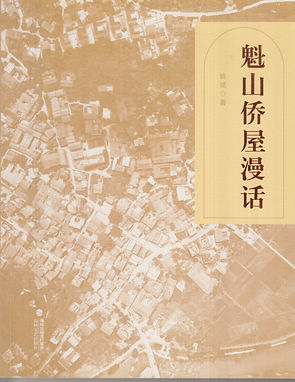
The book by Yao Bin chronicles the history of Yeow Village in Jiangkou Town, Hanjiang District, Putian City.
It provides a detailed account of the many mansions built by members of the Yeow Clan who had returned from overseas. Over time, the sprawling estate, comprising numerous grand residences, was donated to the local authorities, partly because there were no longer any family members available to maintain them as all had left for the Nanyang.
I extend my deepest appreciation to the grandson of Yeow Kim Pong, Johnny Yeow and Putian natives 童志军 for generously sharing with me the history of some of the most notable Yeow family members, and their hometown in Putian. His insights greatly enriched my study tour, and for that, I am profoundly grateful.
Yeow Wei Qi's former Residence
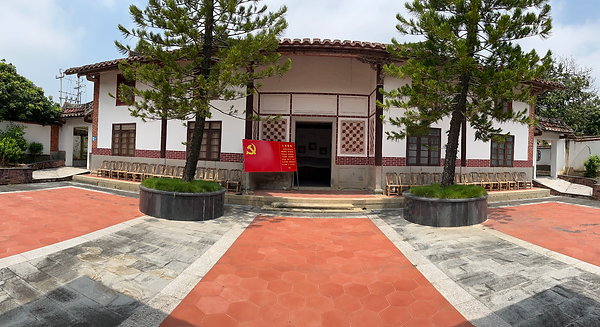
Source: Jason Ong & �童志军
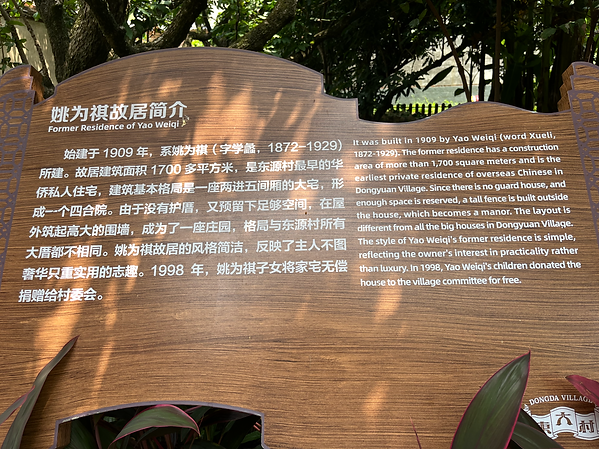
Source: Jason Ong & 童志军
Yeow Wei Qi's residence was the first of many grand homes that would come to define Dong Da Village, also known as Da Dong Village. His estate set the tone for what would become one of the most prominent concentrations of luxury mansions in the region during its time, a legacy that may still hold true today. The village grew into a symbol of prestige and architectural refinement, attracting other affluent families who followed his lead. Today, the entire village, with its rich heritage and historical significance, is overseen by a dedicated committee tasked with its preservation and management.
Putian Students in 1903
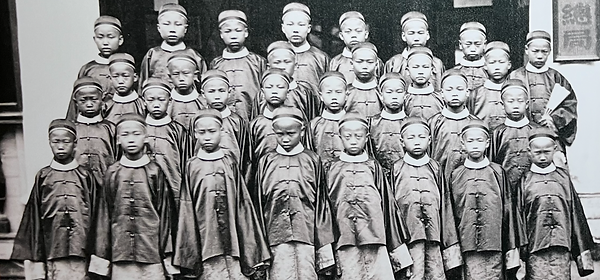
Source: Jason Ong & 童志军
From: Dongda Village Plaque, Putian Students
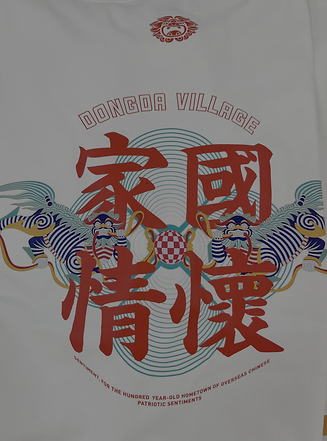
Today, the village has become a tourist destination, where visitors can purchase souvenirs, including T-shirts like the one shown on the left. The site also offers a variety of nostalgic items that reflect cherished memories of the past.
In the near future, these souvenirs may also be made available for purchase online.